

10 Essential Emotional Support Animal Qualifications Explained
by Lena Park
Last updated: July 10, 2025
Verified and Approved by:
Angela Morris,
MSW, LCSW
Fact Checked

Overview
The article highlights the important qualifications necessary to obtain an Emotional Support Animal (ESA) letter, recognizing that individuals often face significant emotional challenges due to diagnosable mental health conditions as defined in the DSM-5. It compassionately addresses the documentation process, which includes the essential evaluation by a licensed mental health professional. This evaluation not only validates the need for an ESA but also ensures compliance with the legal requirements under the Fair Housing Act, providing reassurance to those seeking support.
Introduction
Navigating the complexities of emotional support animal (ESA) qualifications can feel overwhelming for many individuals facing mental health challenges. It’s essential to understand the legal requirements and processes involved, as this knowledge can pave the way for the companionship and comfort that an ESA can provide.
Have you ever wondered what qualifications are necessary to obtain an ESA letter? How can you ensure you meet these criteria in an ever-evolving landscape? This article explores the ten vital qualifications for emotional support animals, offering insights and guidance to help you secure the support you need while navigating the intricacies of legal compliance and emotional well-being.
Wellness Wag: Streamlined Process for Obtaining ESA Letters
At Wellness Wag, we understand the emotional challenges that individuals with mental health issues often face. Navigating these struggles can feel overwhelming, and that’s where we come in. Our straightforward, three-step process for acquiring an Emotional Support Animal (ESA) document is designed with your needs in mind.
- First, you’ll complete a brief online assessment to determine your emotional support animal qualifications. This personalized approach allows us to tailor our services to your unique emotional support animal qualifications, ensuring that you feel heard and understood.
- Next, you will have a compassionate consultation with a licensed mental health professional who will evaluate your situation, providing a safe space for you to share your experiences.
- Once you receive approval, we ensure that you get your official ESA document within 24 hours of your consultation. We know that timely support is crucial for your emotional well-being. However, for states with specific regulations, please allow up to 30 days for delivery as required by law.
After placing your order, you will receive a confirmation email outlining your purchase, reinforcing the efficient process that makes acquiring a legitimate ESA document effortless. We are here to support you every step of the way, and we hope to provide you with the comfort and companionship that an Emotional Support Animal can bring.
Legal Requirements for Emotional Support Animals
Navigating mental health challenges can be incredibly difficult, and many individuals face emotional struggles that impact their daily lives. To meet the emotional support animal qualifications, it is essential for the owner to have a diagnosable mental condition, as defined in the DSM-5. This includes disorders such as:
- Anxiety
- Depression
- PTSD
- Bipolar disorder
A document from a certified mental wellness expert is crucial to confirm the necessity for the ESA. This document should detail the individual’s specific condition and explain how the animal alleviates symptoms associated with their mental health challenges.
As of 2025, legal stipulations for ESA documents require that they be issued on official stationery, include the professional’s credentials, and be dated within the past year to ensure validity for housing providers. Importantly, this document should assert the necessity of the ESA for the individual’s treatment plan while respecting their privacy by not disclosing specific diagnoses to landlords. Understanding the emotional support animal qualifications is vital for those seeking housing accommodations that may impose pet restrictions. The Fair Housing Act mandates reasonable accommodations for ESA owners, allowing them to live with their animals even in no-pet housing.
While ESA documents must be renewed every 12 months, it’s comforting to note that there is no official expiration date. Case studies show that ESA documents not only provide legal protection but also serve as a vital link to emotional support, enhancing the quality of life for individuals facing mental wellness challenges. With approximately 200,000 documented ESAs in the U.S., their prevalence highlights their importance in our society.
If you have any questions or concerns about this Privacy Policy, please feel free to reach out to us at [email protected]. To further ease the process of obtaining valid ESA documents, Wellness Wag offers telehealth services that enhance access to certified mental care specialists, ensuring you receive the support you need.
Licensed Mental Health Professional Evaluation
Navigating the complexities of mental health can be incredibly challenging. For many individuals, emotional struggles such as anxiety, depression, and PTSD can feel overwhelming. A certified mental wellness expert can provide crucial support through a comprehensive assessment, which is essential for meeting emotional support animal qualifications to obtain a legitimate Emotional Support Animal (ESA) document. This evaluation typically involves an in-depth discussion about the individual’s emotional challenges and explores how an ESA can offer therapeutic benefits. Research shows that the presence of an ESA can significantly alleviate feelings of loneliness and anxiety, enhancing overall well-being.
The assessment process usually takes between 30 to 60 minutes, allowing the specialist to gather thorough insights into the person’s mental well-being history and current needs. Many mental wellness experts recommend annual assessments of ESA documents to ensure they accurately reflect the individual’s ongoing requirements. This practice not only supports the individual but also fosters a deeper understanding of their emotional journey.
In states like California, Arkansas, and Montana, new laws mandate a 30-day waiting period for establishing a therapeutic relationship before an ESA document can be issued. This requirement highlights the importance of a thorough assessment of emotional support animal qualifications, ensuring that the need for an ESA is genuinely documented and evaluated over time, providing reassurance to those seeking support.
Licensed mental wellness professionals utilize a variety of assessment tools and techniques to evaluate the emotional support animal qualifications for their clients. These assessments not only facilitate the issuance of valid ESA documents but also strengthen the therapeutic relationship, which is vital for effective mental wellness treatment. The role of these dedicated professionals is essential, as they ensure that the emotional support needs of individuals are met with integrity and care, reinforcing the idea that no one has to face their struggles alone.
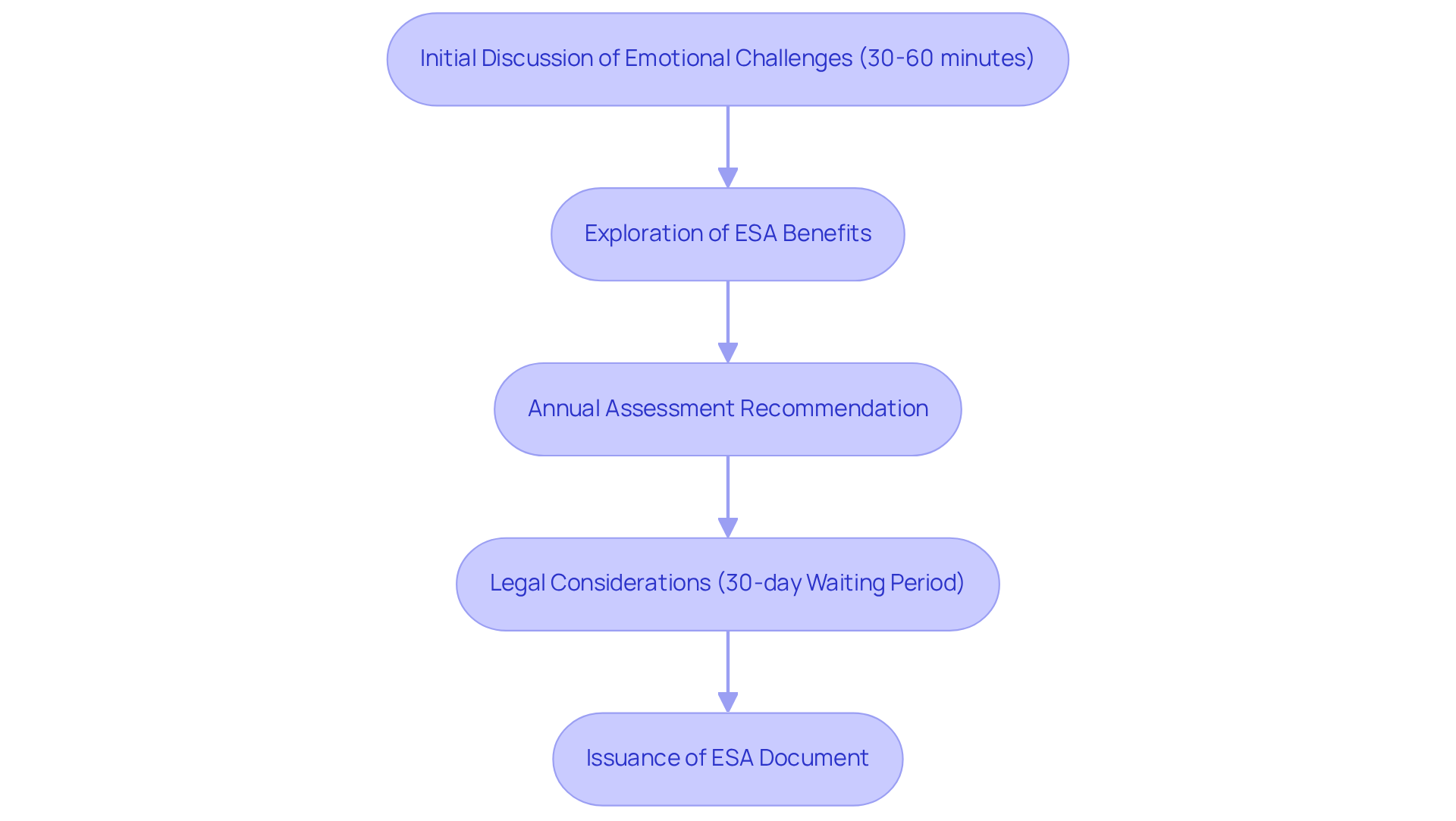
Essential Documentation for ESA Qualification
Navigating the emotional support animal qualifications can feel overwhelming, especially for those facing mental health challenges. To begin this journey, individuals must gather specific documentation. This includes:
- A signed letter from a licensed mental care professional
- Proof of their mental condition
- Any relevant medical records
These steps are crucial for validating the need for emotional support animal qualifications and ensuring compliance with legal requirements.
For those planning to travel, particularly with Air Canada, it’s important to complete the U.S. DOT Service Animal Air Transportation Form. This form requires:
- Vaccination details
- The names of the dog’s handler and trainer
Additionally, it certifies that the service dog is trained in specific assistive functions, will not relieve itself on the airplane, can behave appropriately in public, and will be leashed at all times.
If the flight lasts eight hours or longer, the U.S. DOT’s Service Animal Relief Attestation Form must also be completed. This form certifies that the service dog will either not urinate or defecate on the plane or can do so hygienically, ensuring comfort for everyone on board.
While these requirements may seem daunting, they are designed to support individuals in their journey toward emotional well-being. Remember, you are not alone in this process; there is help available to guide you every step of the way.
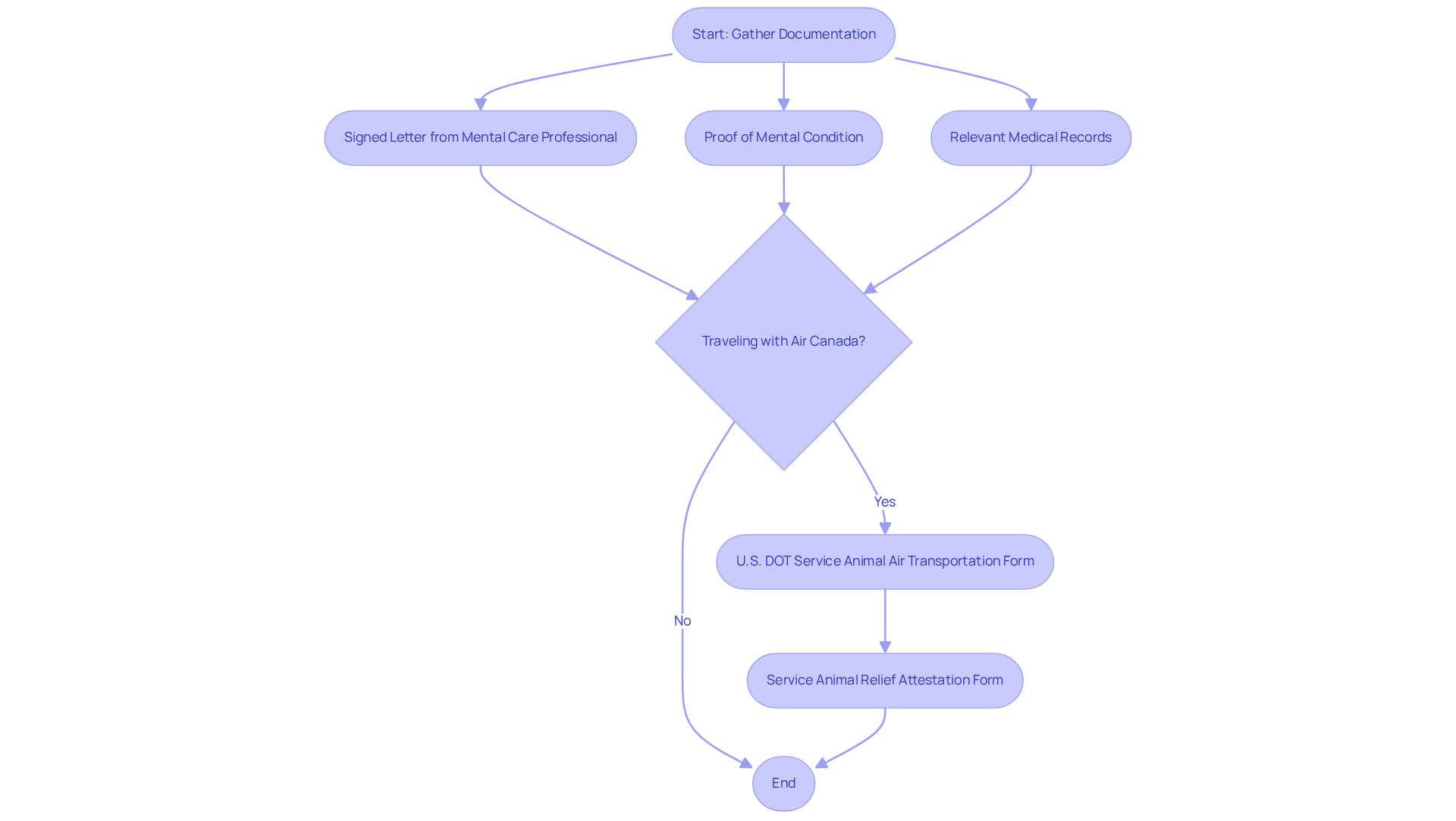
Recognized Mental Health Conditions for ESA Eligibility
Recognized Mental Health Conditions for ESA Eligibility
For many individuals, mental health conditions can create significant emotional challenges. Common conditions that fall under emotional support animal qualifications include:
- Anxiety disorders
- Depression
- Post-traumatic stress disorder (PTSD)
- Bipolar disorder
- Specific phobias
Each of these conditions profoundly impacts an individual’s emotional well-being, often necessitating documentation from a licensed mental care provider to confirm the requirement of an ESA.
Anxiety disorders, affecting approximately 31.9% of adolescents aged 13 to 18, encompass a range of issues, including generalized anxiety disorder and social anxiety disorder. These challenges can lead individuals to seek the companionship of an ESA for emotional stability and comfort. Depression, which co-occurs with anxiety in nearly half of those diagnosed, can severely impair daily functioning and quality of life. For many, the presence of an ESA becomes a source of invaluable support.
PTSD, affecting around 3.6% of U.S. adults, is particularly prevalent among veterans, with studies indicating that 30% of post-9/11 veterans experience this condition. The therapeutic companionship of an ESA can alleviate symptoms such as intrusive memories and heightened arousal, providing essential support during recovery. It’s important to recognize how this support can make a difference in someone’s life.
Bipolar disorder and phobias are included under the emotional support animal qualifications for ESA documentation, as they can disrupt daily routines and social interactions. The presence of an ESA has been shown to reduce anxiety levels and improve mood, making them a vital resource for individuals navigating these conditions. Imagine the comfort of having a loyal companion by your side, helping you through tough times.
Research indicates that emotional support animals can save the U.S. healthcare system an estimated $22.7 billion annually by reducing the need for medical visits and easing symptoms of stress. This highlights the importance of acknowledging and validating the mental conditions that meet emotional support animal qualifications, as they play a vital role in enhancing emotional well-being and overall quality of life.
To obtain an ESA letter through Wellness Wag, individuals can follow these simple steps:
- Visit the Wellness Wag website and complete the online assessment.
- Provide necessary documentation from a licensed mental health professional.
- Finally, obtain your ESA document, which is valid in all states.
Wellness Wag is a reliable source for authentic Emotional Support Animal documents, ensuring a streamlined process for those seeking emotional support. Remember, you are not alone on this journey, and support is available to help you thrive.
Importance of a Valid ESA Letter
For individuals seeking to live with their emotional support animal in housing that typically prohibits pets, understanding the emotional support animal qualifications and having a valid ESA document is crucial. This official documentation not only opens doors to specific travel accommodations but also empowers individuals to assert their rights under the Fair Housing Act and other relevant regulations. Without a valid ESA document, the challenges can be overwhelming, potentially leading to eviction or rejection of housing requests. Many ESA owners face substantial difficulties without proper documentation, underscoring the importance of understanding emotional support animal qualifications to secure a valid ESA certification.
Consider the emotional toll: many ESA claimants report feelings of social isolation and loneliness, with 56.0% indicating these struggles, which can worsen due to housing restrictions. Case studies reveal that individuals lacking valid ESA documentation often find it hard to secure housing in pet-restricted environments, highlighting the critical need for appropriate paperwork.
Experts emphasize that a valid ESA document is crucial for establishing emotional support animal qualifications and also plays an essential role in protecting housing rights. This ensures that individuals can advocate effectively for their needs. At Wellness Wag, we understand these challenges and offer a streamlined online process for obtaining your ESA letter. We prioritize client communication and privacy while providing state-specific guidance to help you navigate your rights effectively. You are not alone in this journey; support is available to help you advocate for your emotional well-being.
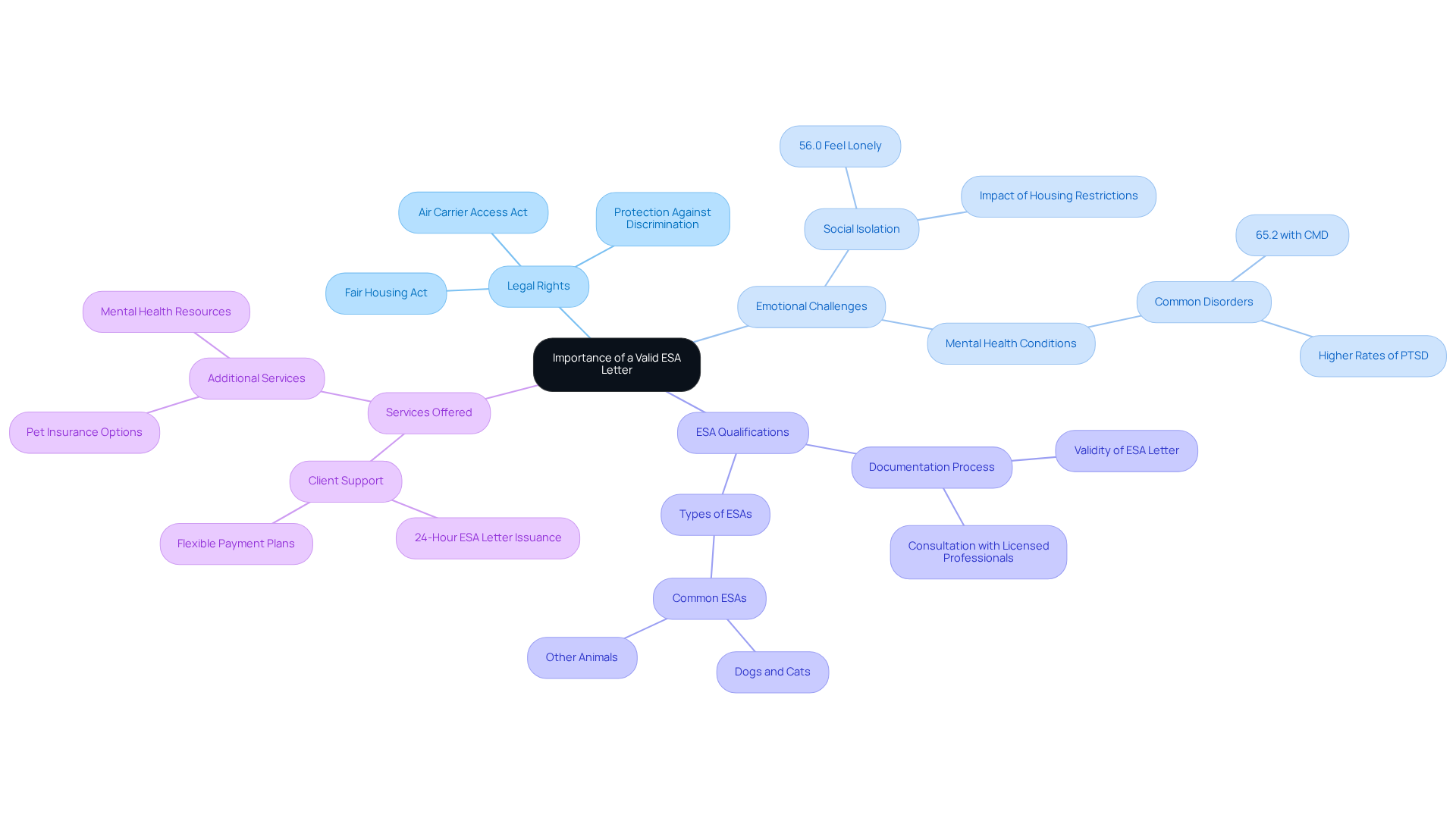
Differences Between Emotional Support Animals and Service Animals
Emotional Support Animals (ESAs) provide essential comfort and companionship to those navigating emotional or psychological challenges. However, it’s important to understand that they do not possess the specialized training necessary to perform specific tasks. In contrast, assistance animals, typically dogs or miniature horses, are trained to assist individuals with disabilities in their daily activities, and they enjoy broader access rights under the Americans with Disabilities Act (ADA). This distinction is vital for anyone considering their pets for support.
Legal frameworks further clarify these differences, as service animals are granted access to public spaces and housing under the ADA, while ESAs do not benefit from the same protections. A recent case study highlighted the confusion surrounding the legal status of ESAs, emphasizing that they do not qualify for the same rights as service animals, which are trained to perform specific tasks related to a disability.
Recent updates to regulations have reinforced these distinctions, with the ADA clearly stating that emotional support does not equate to a task. This has led to a significant misunderstanding among the population—over 60%—regarding the roles and rights of ESAs compared to service animals. Experts indicate that while ESAs can alleviate symptoms of anxiety and depression, they are not recognized as service animals under federal law, which limits their access to public accommodations.
Understanding these legal nuances is crucial for individuals seeking to utilize their pets effectively, particularly in the context of emotional support animal qualifications when navigating housing restrictions or travel challenges. By recognizing the specific roles and rights of ESAs versus assistance animals, individuals can advocate for their needs more effectively and ensure compliance with relevant regulations.
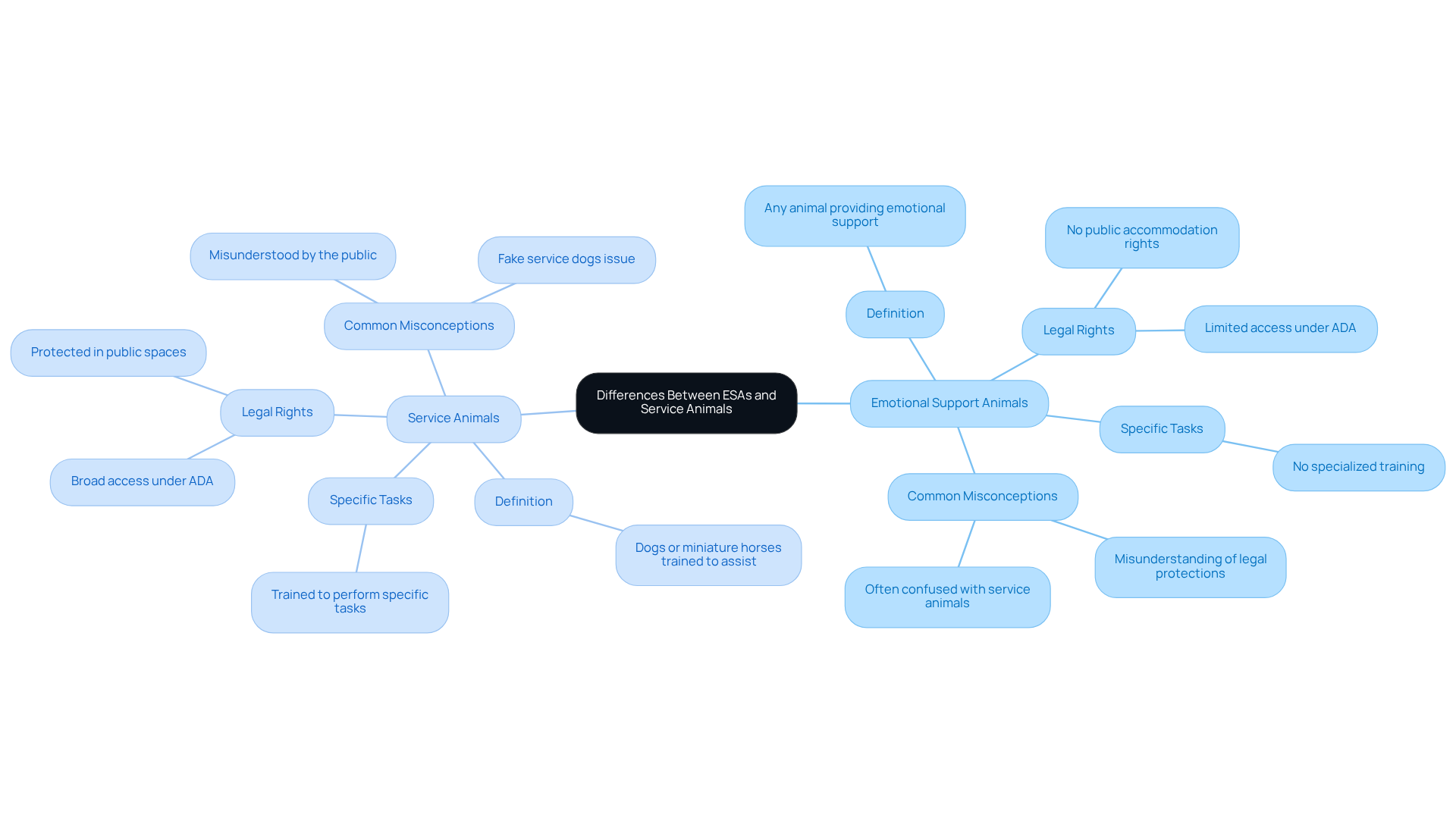
Housing Rights Under the Fair Housing Act
Under the Fair Housing Act (FHA), individuals with disabilities are entitled to reasonable accommodations for their emotional support pets (ESPs), even in no-pet housing. This federal law ensures that landlords must permit ESAs, provided the tenant presents a valid ESA letter from a licensed mental care professional. It’s heartening to note that recent statistics show approximately 80% of landlords comply with ESA regulations, recognizing the vital role these creatures play in supporting tenants’ mental health needs.
The FHA serves as a protective shield against discrimination, safeguarding tenants’ rights to live with their support animals. It’s important to understand that landlords cannot deny housing solely based on the presence of an ESA, as long as the tenant satisfies the emotional support animal qualifications. This legal framework has been reinforced by recent court cases that upheld the rights of ESA owners, affirming that emotional support animals are not classified as pets under the law.
When requesting accommodations, clear communication and proper documentation are key. Tenants who provide a valid ESA letter detailing their mental health condition and the necessity of their pet often find success in their housing applications. Moreover, case studies reveal that landlords who approach ESA requests with care can prevent potential legal challenges, as mishandling such requests may lead to discrimination lawsuits.
Overall, the FHA stands as a crucial protection for ESA owners, empowering them to advocate for their rights and ensuring they can live alongside their emotional support companions, regardless of housing restrictions. It’s a reminder that support is available, and that everyone deserves a safe and nurturing environment to thrive.
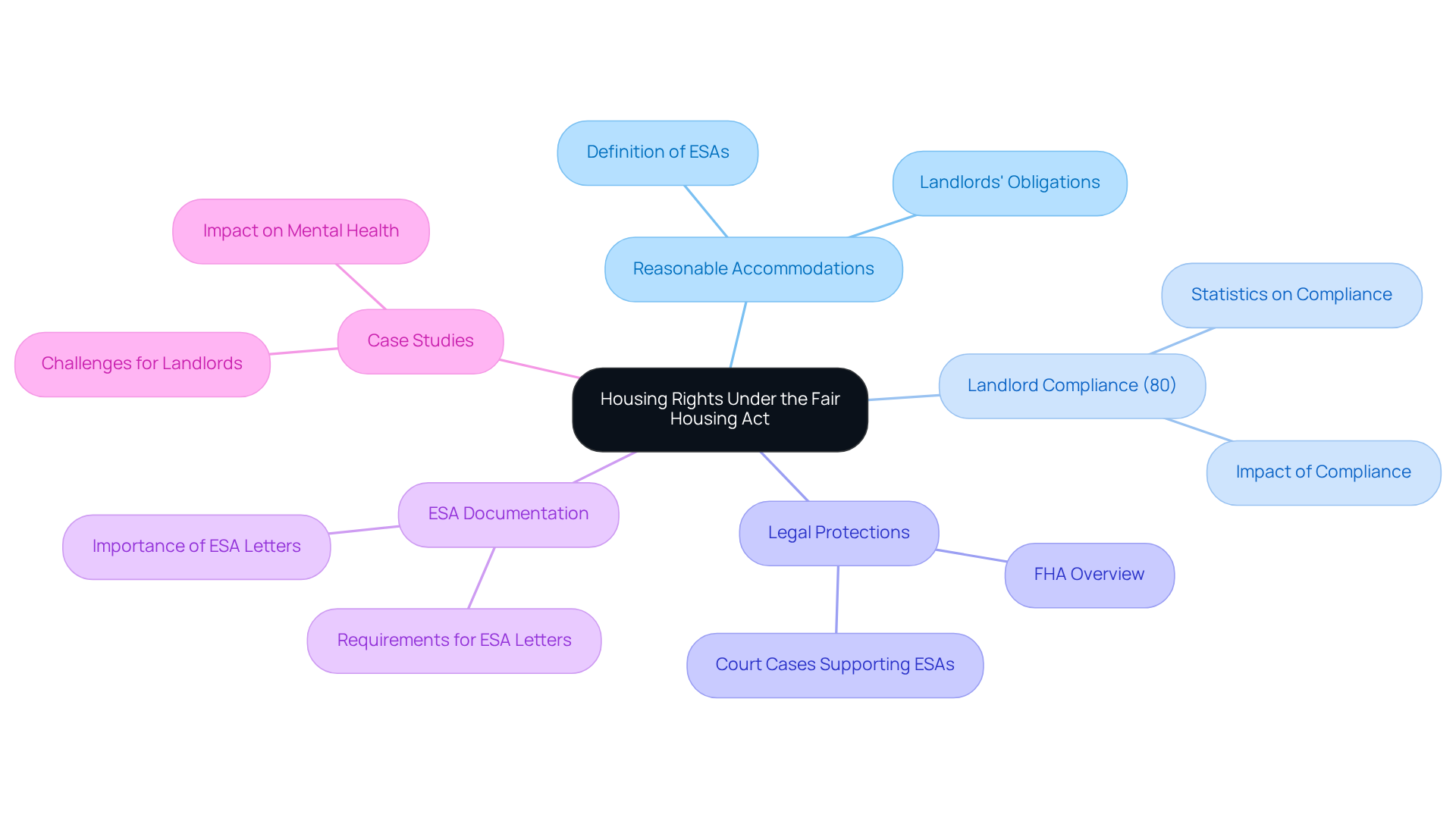
Travel Regulations for Emotional Support Animals
Travel regulations for emotional support animals (ESAs) have changed significantly, which can be quite distressing for many pet owners. Airlines, including Air Canada, no longer recognize ESAs as service animals, leading to potential challenges for those relying on their support. As a result, ESA owners may find themselves subject to standard pet policies, which can include specific fees and carrier requirements that add to their worries.
For Air Canada, it is essential to complete a U.S. DOT form and notify the Medical Assistance Desk at least 48 hours prior to your flight. This process can feel overwhelming, but it is a necessary step to ensure your journey is as smooth as possible. Additionally, while there are no breed limitations for service dogs, it’s important to note that snub-nosed breeds may face restrictions due to their medical risks during travel.
Pet carriers must meet size guidelines, and only one cat or small dog is permitted, provided they meet age and health requirements. This can be a source of anxiety for ESA owners, who should check with Air Canada for specific regulations and ensure they meet the emotional support animal qualifications while having the necessary documentation for travel. A recommended PSD letter can help facilitate a smoother check-in process.
It’s crucial to remember that psychiatric service dogs (PSDs) are recognized and have different rights and requirements than those outlined by emotional support animal qualifications. This distinction can be confusing, but knowing the differences can empower ESA owners to navigate their travel experiences more confidently. The support available to you is important, and understanding these regulations can help ease some of the emotional burdens you may face.

Ethical Considerations for Emotional Support Animal Ownership
Having an emotional support pet involves important ethical obligations. It’s essential to guarantee the pet’s welfare and to avoid misrepresenting its role. At Wellness Wag, we deeply care about safeguarding the confidentiality of your medical information in accordance with HIPAA. This commitment highlights the significance of ethical practices in emotional support animal qualifications.
As an ESA owner, it’s crucial to recognize the potential effects on your mental well-being and the importance of nurturing a positive bond with your pet. This bond can be a source of comfort and stability in challenging times. Additionally, understanding the emotional support animal qualifications under the Americans with Disabilities Act (ADA) is vital. This knowledge helps clarify the differences between emotional support animals and service dogs, ensuring that you are informed and empowered.
Ethical ownership also means advocating for responsible ESA practices and respecting the rights of others in public spaces. By doing so, you contribute to a community that values compassion and understanding. Remember, you are not alone in this journey; support is available, and together we can foster a nurturing environment for both you and your emotional support pet.
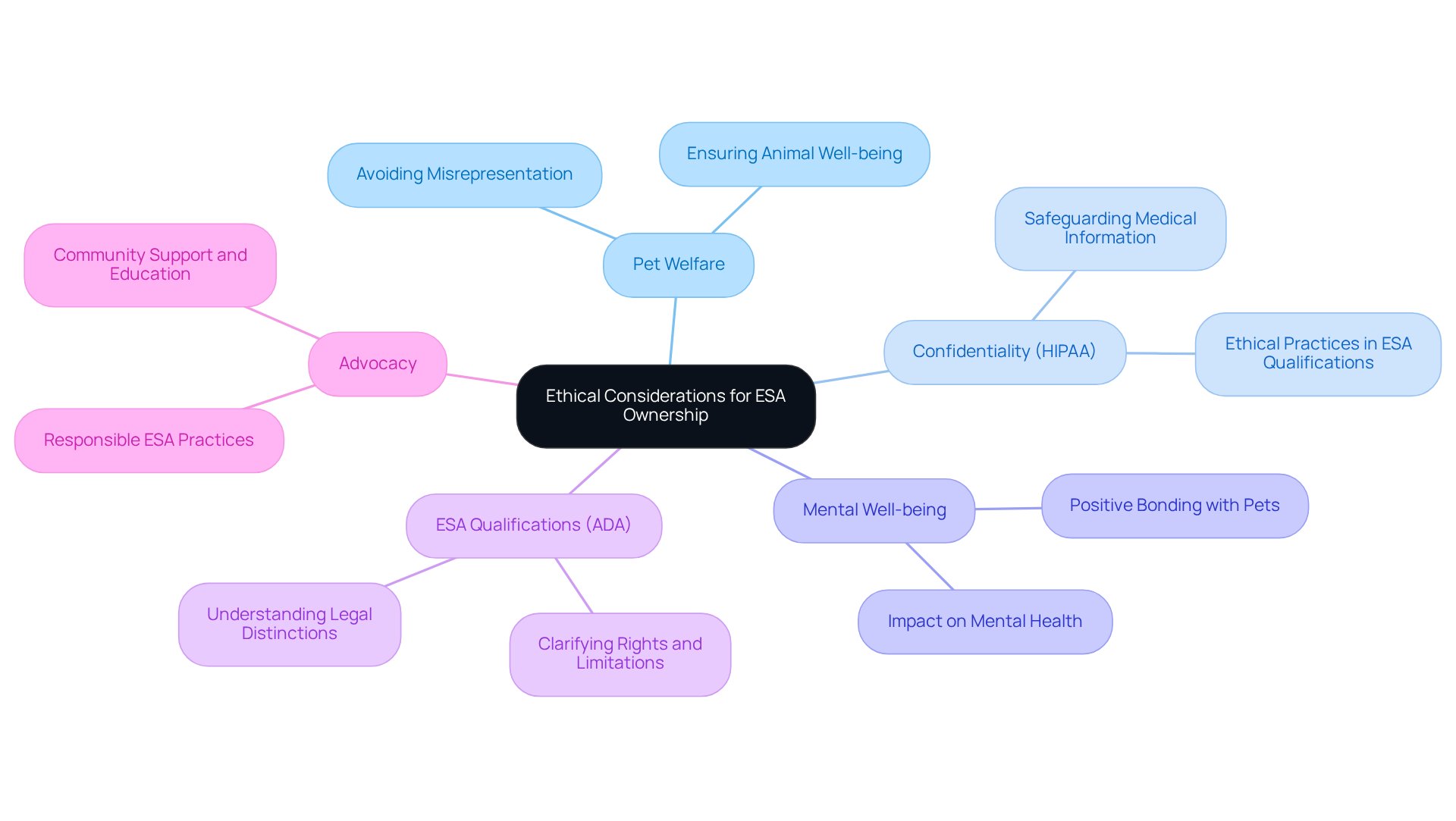
Conclusion
Navigating the qualifications for emotional support animals (ESAs) can be a daunting journey for those seeking companionship and comfort. It’s essential to understand the legal requirements and processes involved, as this knowledge empowers individuals to secure the support they need while ensuring compliance with regulations. Obtaining a valid ESA letter is a crucial step in this process, and knowing the necessary steps can make all the difference.
Many individuals face emotional challenges that can feel overwhelming. The essential qualifications required to obtain an ESA document are not merely bureaucratic hurdles; they represent a pathway to emotional well-being. A licensed mental health professional’s evaluation is significant, as it validates the necessity of an ESA and provides the documentation needed for support. Understanding these requirements can alleviate some of the stress associated with the process.
It’s also important to recognize the differences between ESAs and service animals, as well as the legal protections afforded under the Fair Housing Act. With evolving travel regulations impacting ESA owners, staying informed is vital. Each of these elements plays a vital role in empowering individuals to advocate for their rights and access the emotional support they deserve.
Ultimately, the journey to obtaining an ESA letter transcends mere legalities; it is about enhancing emotional well-being and fostering a supportive environment. Those seeking an ESA should feel encouraged to take proactive steps in understanding their rights and responsibilities. Living harmoniously with emotional support companions is possible, and support is available. With the right information and guidance, individuals can navigate the complexities of emotional support animal qualifications with confidence and compassion.
Frequently Asked Questions
What is the process for obtaining an Emotional Support Animal (ESA) letter from Wellness Wag?
The process involves three steps: completing a brief online assessment to determine qualifications, having a compassionate consultation with a licensed mental health professional, and receiving the official ESA document within 24 hours of approval. In some states with specific regulations, delivery may take up to 30 days.
What qualifications are necessary to obtain an ESA?
To qualify for an ESA, the owner must have a diagnosable mental condition as defined in the DSM-5, such as anxiety, depression, PTSD, or bipolar disorder. A document from a certified mental wellness expert is required to confirm the necessity of the ESA.
What are the legal requirements for ESA documents?
As of 2025, ESA documents must be issued on official stationery, include the professional’s credentials, and be dated within the past year. The document should assert the necessity of the ESA for treatment while maintaining the individual’s privacy regarding specific diagnoses.
How often do ESA documents need to be renewed?
ESA documents must be renewed every 12 months, although there is no official expiration date for them.
What protections do ESA owners have under the Fair Housing Act?
The Fair Housing Act mandates reasonable accommodations for ESA owners, allowing them to live with their animals even in housing that typically prohibits pets.
How long does the evaluation with a licensed mental health professional take?
The evaluation typically takes between 30 to 60 minutes, allowing the specialist to gather insights into the individual’s mental well-being history and current needs.
Are there any waiting periods for obtaining an ESA document in certain states?
Yes, in states like California, Arkansas, and Montana, there is a mandated 30-day waiting period to establish a therapeutic relationship before an ESA document can be issued.
How does having an ESA benefit individuals with emotional struggles?
Research shows that the presence of an ESA can significantly alleviate feelings of loneliness and anxiety, enhancing overall well-being for individuals facing emotional challenges.
Certify Your Emotional Support Animal Today

Why You Can Rely on Us?
At Wellness Wag, we believe your pet deserves care rooted in both science and compassion. Each article is carefully researched, written in clear language for pet owners, and then reviewed by qualified professionals to ensure the information is evidence-based, current, and practical for real-life care. Our goal is to help you feel confident in making informed decisions about your pet’s health and well-being.
Reviewed by
Angela Morris, MSW, LCSW
Angela is a licensed clinical social worker with 20 years of experience in patient advocacy and community mental health. She has assisted numerous clients with ESA evaluations and brings a deep understanding of disability accommodations, ensuring that all information is accurate, supportive, and practical.

Written by :
Lena Park
Last Updated :
July 10, 2025












